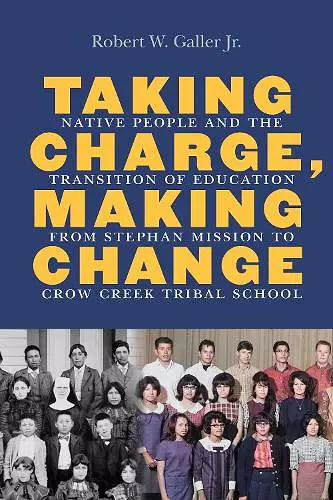Taking Charge, Making Change
Native People and the Transition of Education from Stephan Mission to Crow Creek Tribal School
Format:Hardback
Publisher:University of Nebraska Press
Published:1st Jan '25
Currently unavailable, and unfortunately no date known when it will be back

Taking Charge, Making Change gives voice to generations of Native people—from Crow Creek, Lower Brule, and other reservations in North Dakota and South Dakota—who shaped a school originally designed to foster Catholicism and assimilation. Local initiatives and collaboration transformed the Catholic Stephan Mission boarding school into the Crow Creek Tribal School, which now features both tribal traditions and American educational programs.
Through archival research and interviews with parents, graduates, teachers, and staff at Crow Creek and the surrounding community, Robert W. Galler Jr. places Native students at the heart of the narrative, demonstrating multifaceted family connections at a nineteenth-century, on-reservation religious school that evolved into a tribally run institution in the 1970s. He shows numerous ways that community members worked with Catholic leaders and ultimately transformed their mindsets and educational approaches over nearly a century. While recognizing the many challenges and tragedies that Native students endured, Galler highlights the creativity, collaborations, and contributions of the students and graduates to their communities.
Taking Charge, Making Change shows how individuals and families helped to found the school, maintain enrollment, secure funding, and influence school policies. Its graduates went on to serve with distinction in the U.S. military, earn advanced degrees after college, join and lead tribal councils in North and South Dakota, help their communities push back against federal policies, and continue to run their own education system.
“Taking Charge, Making Change tells us about a more than one-hundred-year transition of struggle and Indigenizing a Catholic mission into a successful Dakota operated school. This is a beautiful story of Native resilience, Indian self-determination, and tribal sovereignty.”—Donald L. Fixico (Muscogee, Seminole, Shawnee, and Sac and Fox), author of Call for Change: The Medicine Way of American Indian History, Ethos, and Reality
“Galler gives our Ihaƞktuwanƞa relatives at Crow Creek the complex and nuanced discussion they deserve through this well-researched and thoughtful contribution. He shares their history as advocates fighting for their sovereignty and the future of their community through taking back control of their education system.”—Iyekiyapiwin Darlene St. Clair (Mdewakaƞtuƞwaƞ Dakota, Lower Sioux), Indigenous research professor in the College of Education and Human Development at the University of Minnesota
“Taking Charge, Making Change skillfully braids together a rich and deeply rooted community history with the broader strands of the American story. The result is a profound illustration of the power of Indigenous families’ everyday decisions in shaping their community, state, and nation. In centering the families who maintained the Stephan Mission School it reveals that the school was never just a school and not merely a colonial tool, but a key site of survival, intergenerational relationships, and enduring visions of tribal sovereignty.”—Cathleen D. Cahill, author of Recasting the Vote: How Women of Color Transformed the Suffrage Movement
“This authoritative and inclusive history of Stephan Mission traces the motivations of the Catholic Church and the Crow Creek Sioux Tribe for educating Indian children in Crow Creek Reservation, culminating with the tribe recently taking control back from the church.”—Craig Howe (Oglala Sioux Tribe), founder and director of the Center for American Indian Research and Native Studies at the Pine Ridge Reservation and coeditor of He Sapa Woihanble: Black Hills Dream
“Taking Charge, Making Change is important because it outlines the history of a school that has not been thoroughly documented in other studies. Further, this book will enhance the literature that is already in place because it examines a boarding institution that facilitates the needs of (primarily) the Dakota and Lakota Sioux in the aftermath of the Minnesota Sioux War of 1862.”—Cynthia Leanne Landrum, author of The Dakota Sioux Experience at Flandreau and Pipestone Indian Schools
ISBN: 9781496239815
Dimensions: unknown
Weight: unknown
442 pages